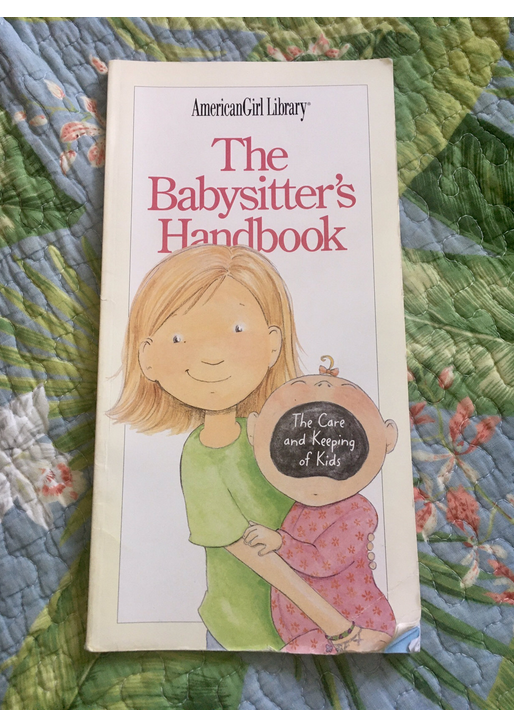On Feeling Twelve Years Old
This is for a bird who could not imagine me as someone who has large, extravagant outbursts.
Sometimes when asked, "how I am doing", I answer "I feel twelve years old". This is an oddly specific age to reference for someone who cannot even tell you the appropriate age for any Studio Ghibli film. ("At how old does watching parents turn into pigs Not Haunt Your Dreams?")
When I was a pre-teen, I was obsessed with a particular brand of Self-Help books. I had these AmericanGirl Library books that I collected like candy, regardless if they applied to me or not. I purchased this one on babysitting with my allowance because the girl on the cover was pretty.

Image Text: An image of the cover of AmericanGirl Library's "The Babysitter's Handbook". The cover has a prettily drawn girl with bob-length hair holding a bawling baby. The baby's wide-open mouth contains the subtitle "The Care and Keeping of Kids".
The book referenced the age 12 as a common age at which kids are able to take on the responsibility of working as babysitters. In my very sheltered protected home, I was hungry for responsibility. So, when I turned 12, I approached my parents and told them I wanted to begin babysitting children in the local Serbian community. Kids that I had played with before at parties that were 5-6 years or so younger than me.
My mother said No. I was really upset about this. My mother partially acquiesced and said that we could have children over, and I could spend time with them in our home, under a grandparents' or parents' supervision. This was not a compromise I was satisfied with. It did not address the root need to be trusted with a significant responsibility.
Now as an adult, I could see the tension between my mother and I. She did not actually tell me what path could take me from not being trusted to care for children to being trusted to care for children. She did not give me an age or a set of skills. She did not say, "If you babysit under supervision X times, and are still interested, you can then try babysitting a child you already know un-supervised".
It was a straight up No, with no path to go from where I was to where I wanted to be.
What matters for the post is this emotional pattern: I could not have something I wanted and it felt like I was never going to have the thing I wanted. And I did not take on responsibility on setting goals or gaining skills so I could get the thing I wanted one day or learn to let go. I was twelve and I threw a tantrum.
I felt really, really strong, raw emotions. And when I tell people that I am feeling twelve, those are the emotions that I am referencing.
These emotions came up when I was struggling to find any bioinformatics work in my graduate lab, and the few honest-to-goodness sequencing work ended up being outsourced to another lab. They come up when people tell me they have a model of me in their head, and that the opportunities for intimacy or conflict they give me are based off of that model. They come up when I think an expertise I have is being overlooked. They come up when I feel that I am not being admired or ever filling a person with awe.
I feel helpless and powerless to get what I want because I feel like the things I have to change are people's brains or models of me, and How Do You Change That??
I can parent myself now. I can identify the inner child of twelve years old, and see what is going on. I can name the raw ache for what it is.
I stop myself from throwing tantrums (most of the time...); they are not a very good strategy. I mean no one is going to react in the desired way to "Whyyyyy do you not admiiiire meeeee". At best, if they are really emotionally perceptive, they will perceive that I am 12, and enter a soothing mode. This is really counter to what my 12-year old actually wants: to be perceived and related to as a skilled adult. This strategy reasonably makes it really hard for people to honestly do that.
A note to my future self: sometimes my feelings are over a perceived (or actual) skill gap. If this comes up in a professional context, it is appropriate to ask someone the right questions on how I can eventually get to the place of being trusted. If I am caring about being admired, honestly, all I can do is let it go. I cannot choose someone's models for them. All I can do is act in good faith and tend to my plot of land, and see what grows.
But god, how we perceive others is such a powerful thing. Is it not terrifying?